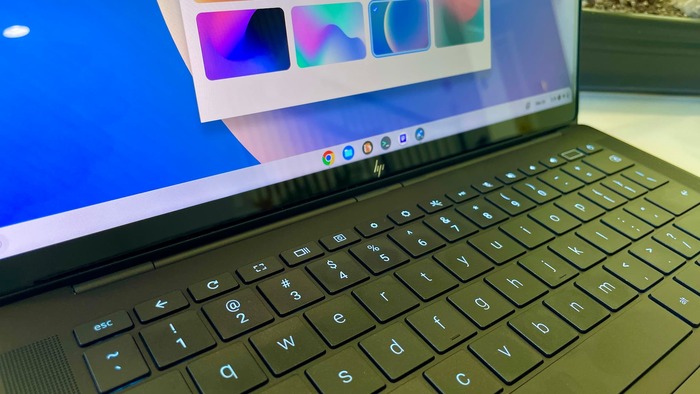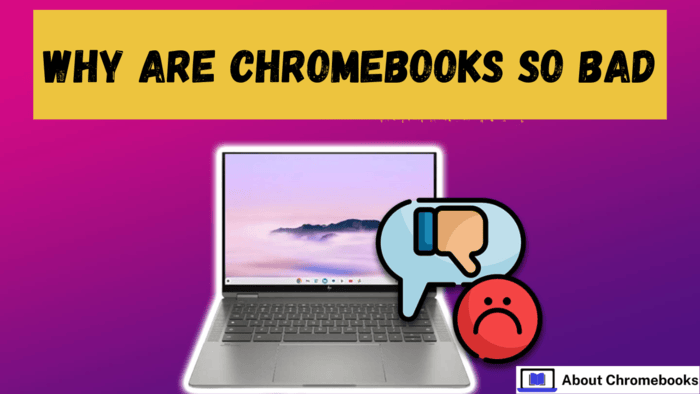Are you considering a Chromebook? Or do you already own one and think another laptop might work better? Chromebooks often have a reputation for being less capable than other computers.
However, they do have some benefits. Although they lack the power of MacBooks or many Windows laptops, Chromebooks offer unique advantages.
Below is an overview of their pros and cons to help you decide if a Chromebook fits your needs.
Key Points
- Chromebooks are lightweight, affordable, and support Android and Linux apps.
- They are unsuitable for gaming, multimedia editing, or graphic design.
- They are ideal for students, educators, and businesses using Google Workspace tools.
What Are Chromebooks?

Chromebooks are laptops that rely heavily on cloud services. They run on Google’s Chrome OS instead of Windows or macOS.
Unlike traditional laptops, Chromebooks focus on internet-based and web apps for most tasks.
Advantages
Affordable Options
Chromebooks are budget-friendly. They don’t require expensive hardware for Windows or macOS, as ChromeOS is lightweight. They also use cloud storage, so large hard drives aren’t necessary.
Lightweight Design
Due to their minimal hardware needs, Chromebooks are slim and portable. They are an excellent choice for students or travelers needing an easy-to-carry device.
Good Battery Life
Chromebooks consume less power, resulting in longer battery life than many Windows laptops or MacBooks.
Cloud-Based Apps and Storage
Chromebooks run web apps and save files online. They back up data automatically and allow easy transitions to a new Chromebook.
Minimal Updates
Apps and the operating system update automatically. You always get the latest versions without constant manual updates.
Improved Security
Chromebooks use “sandboxing,” which isolates apps for better security. This design reduces the risk of viruses and malware.
Cost-Effective Software
Google apps like Docs and Sheets are free, unlike costly Windows or macOS software. Affordable third-party apps are also available.
Android and Linux App Compatibility
Chromebooks support Android apps via the Google Play Store. Many also allow Linux installations for additional software flexibility.
Disadvantages
Limited Storage
Most Chromebooks have small hard drives (32–64 GB), restricting offline app usage. Larger storage models are available but are more expensive.
Dependence on Internet
A Chromebook’s capabilities are limited without a reliable internet connection since most tasks rely on online access.
Lower Hardware Specs
Chromebooks typically have essential processors and about 4 GB of RAM. They may lag during multitasking or when many browser tabs are open.
Low Display Quality
Most Chromebooks have lower-resolution screens, which might not provide sharp visuals. Higher-resolution options are pricier.
Software Restrictions
Chromebooks cannot run Windows or macOS apps directly like Microsoft Office or Adobe Creative Cloud. Workarounds exist but can be inconvenient.
Not for Gaming
Chromebooks lack the power and compatibility to run most modern games. Some Android games may work, but performance is limited.
Inadequate Multimedia Work
Graphic design, video editing, and audio production tools are limited. Screen resolution and hardware constraints affect performance for high-quality media work.
Printer Compatibility Issues
Some older printers may not work wirelessly with Chromebooks. A USB connection may be necessary for printing tasks.
Who should use a Chromebook?

Teachers and students
Schools often buy Chromebooks in large numbers because they are cheap. They give them to students and teachers.
Many Chromebook apps help with learning and productivity, making them useful for education.
Basic computer users
Chromebooks are ideal if you use a computer for email, browsing, and light word processing. They are low-cost, simple to set up, and ready to use straight out of the box.
Businesses and employees using Google tools
Chromebooks can work well for employees if your business relies on tools like Google Docs, Gmail, or Google Classroom. Their ease of use also reduces the need for IT support.
Are Chromebooks bad?
It depends on your requirements.
If you are a student or need an affordable laptop for basic tasks, a Chromebook is a good choice.
But if you need a high-performance gaming or video editing computer, consider a PC or MacBook instead.
The post Why Are Chromebooks So Bad? appeared first on About Chromebooks.

